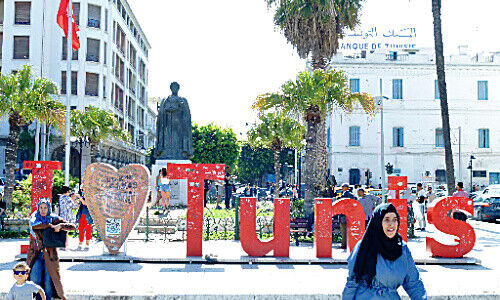The Swiss government has lifted a freeze on funds suspected to have been hidden in Swiss bank accounts by the former rulers of Tunisia. The government of the country on the Mediterranean is still hoping for a return to the financially troubled country.
The Swiss government had no other option: with the reaching of the legally defined time limit on the freeze of foreign assets, the so-called Ben Ali funds had to be deblocked. This was done by the Swiss authorities in the night of today, Tuesday, after the expiry of the 10-year deadline, as the Federal Department of Foreign Affairs (FDFA) writes in a statement.
Most of the Money Remains Blocked
What will now happen to the assets amounting to about 60 million francs ($68 million) has not yet been decided. The unblocking of the assets only removes one stage of the official orders. Those assets that are subject to the second level of freezes in the context of national legal proceedings or in the context of requests for mutual legal assistance have not been freed by the expiration of the general time limit, the FDFA writes.
Thus, the Swiss government is still interested in assisting the Tunisian state in the repatriation of funds to which it is demonstrably entitled. In the present case, this concerns «the vast majority of the assets», as the FDFA emphasizes.
«The expiration of the freeze does not change Switzerland's willingness to return assets whose illegal origin has been established,» it said. «Switzerland will continue to support the asset recovery process,» it added.
Cooperation Seems to Be Stalling
However, cooperation with the authorities in Tunisia is apparently still sticking. An «Associated Press» report quotes the Tunisian presidency as saying that it is working with the government of Zichem Mechichi on the extradition of the funds, but the announcement by Swiss authorities can also be interpreted to mean that progress hasn't come that far, or rather that the two governments are blaming each other.
«Judicial cooperation between Switzerland and Tunisia has allowed for the exchange of much evidence. Nevertheless, confiscation orders proving the illegal origin of the assets in Switzerland or amicable agreements confirmed by the Tunisian judiciary are necessary to allow further restitution. Under these conditions, the prospects for restitution now depend on the progress of Tunisian criminal proceedings and judicial cooperation,» the foreign ministry of Switzerland stated.
Troublemakers Press Tunisian Government
Success on this issue would undoubtedly be convenient for the Tunisian government. First, the current economic crisis has hit emerging economies hard, driving up unemployment. According to «trading economics», the unemployment rate rose by almost 3 percentage points to 18 percent in the second quarter. And second, the economic hardship is not only driving more and more young Tunisians to flee to Europe but has also recently led to unrest again.
In recent nights, police arrested hundreds of rioters, as «france24» reported.






























